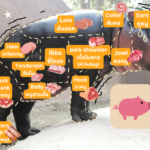| 它 | - (tā, ㄊㄚ) it (used for things) [CE-DICT]
|
| 是 | - (これ) (pn) (1) (uk) (See 何れ・1,其れ・1,彼・あれ・1) this (indicating an item near the speaker, the action of the speaker, or the current topic); (2) (hum) this person (usu. indicating someone in one's in-group); (3) now; (4) (arch) here; (5) (arch) I (me); (6) (arch) certainly; (P) [EDICT]
- (ぜ) (n) righteousness; justice; right [EDICT]
- (shì, ㄕˋ) is; are; am; yes; to be [CE-DICT]
|
| 隔 | - (かく) (pref) every other; second; alternate [EDICT]
- (gé, ㄍㄜˊ) to separate; to stand or lie between; to divide; to cut off [CE-DICT]
|
| 离 | - (lí, ㄌㄧˊ) to leave; to depart; to go away; from [CE-DICT]
|
| 创 | - (chuāng, ㄔㄨㄤ) a wound; cut; injury; trauma [CE-DICT]
- (chuàng, ㄔㄨㄤˋ) begin; initiate; inaugurate; start; create [CE-DICT]
|
| 造 | - (zào, ㄗㄠˋ) to make; to build; to invent; to manufacture [CE-DICT]
|
| 的 | - (てき) (adj-na,suf) -like; typical; (P) [EDICT]
- (まと) (n) mark; target; (P) [EDICT]
- (de, ㄉㄜ˙) of; structural particle: used before a noun, linking it to preceding possessive or descriptive attributive [CE-DICT]
- (dí, ㄉㄧˊ) really and truly [CE-DICT]
- (dì, ㄉㄧˋ) aim; clear [CE-DICT]
|
| 独 | - (どく) (n) (abbr) (See 独逸) Germany [EDICT]
- (dú, ㄉㄨˊ) alone; independent; single; sole; only [CE-DICT]
|
| 特 | - (tè, ㄊㄜˋ) special; unique; distinguished; especially; unusual; very [CE-DICT]
|
| 性 | - (しょう) (n,n-suf) (1) nature (of a person or thing); (2) {Buddh} that which does not change according to external influences [EDICT]
- (せい) (n) (1) nature (of a person); (2) sex; (3) gender; (suf) (4) (indicating quality or condition) -ty; -ity; -ness; -cy; (P) [EDICT]
- (さが;なりくせ(性)(ok)) (n) (1) one's nature; one's destiny; (2) custom; tradition; habit [EDICT]
- (xìng, ㄒㄧㄥˋ) nature; character; property; quality; attribute; sexuality; sex; gender; surname; suffix forming adjective from verb; suffix forming noun from adjective, corresponding to -ness or -ity; essence [CE-DICT]
|
| 你 | |
| 知 | - (ち) (n) (1) wisdom; (2) {Buddh} jnana (higher knowledge) [EDICT]
- (zhī, ㄓ) to know; to be aware [CE-DICT]
|
| 道 | - (どう) (n) (1) (abbr) road; (2) way; (3) Buddhist teachings; (4) Taoism; (5) modern administrative region of Japan (Hokkaido); (6) historical administrative region of Japan (Tokaido, Tosando, etc.); (7) province (Tang-era administrative region of China); (8) province (modern administrative region of Korea) [EDICT]
- (みち) (n) (1) road; street; way; path; course; route; lane; (2) distance; ways (e.g. "a long ways"); (3) the way (of proper conduct, etc.); one's way; morals; (4) teachings (esp. Confucian or Buddhist); dogma; (5) field (of medicine, etc.); subject; (6) way; method; means; (P) [EDICT]
- (ち;ぢ) (n) (1) (arch) (ち only) (See 路・じ) way; road; (n-suf) (2) (usu. ぢ) way to ...; road to ... [EDICT]
- (dào, ㄉㄠˋ) direction; way; method; road; path; classifier for long thin stretches, rivers, roads etc; principle; truth; morality; reason; skill; method; Dao (of Daoism); to say; to speak; to talk [CE-DICT]
|






